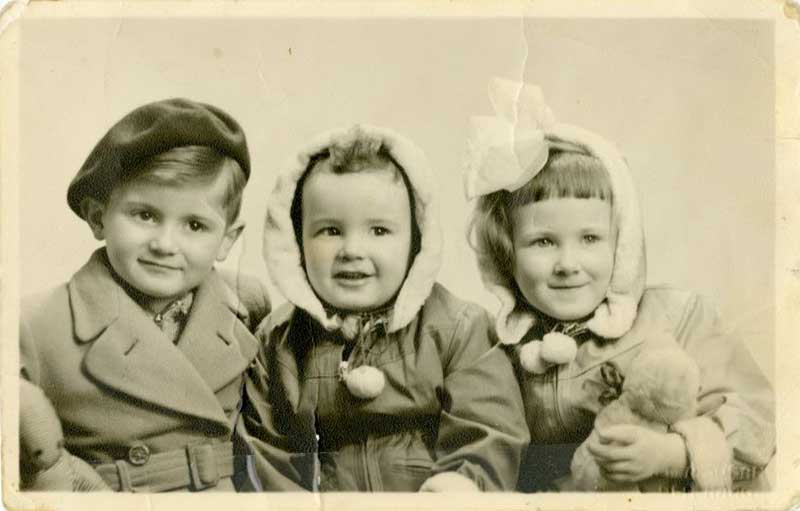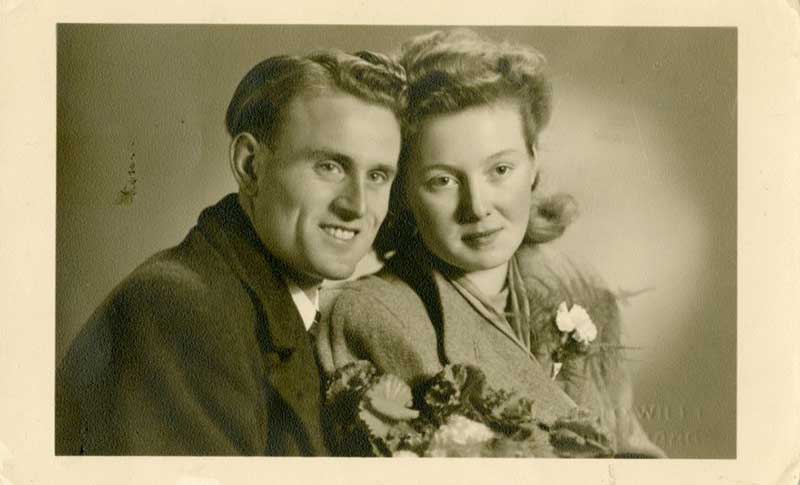Sobey Wall of Honour
Column
169
Row
11
From Marian (Cats) Smisek, passenger on S.S. Waterman, March 25, 1952
I'm writing the stories of our journey from Holland to Canada as told to me by my mother and father. I do have some memories of the journey though I was only 3 years old.
Before leaving Holland, there was much writing of letters and my mother giving things away to family members those items that couldn't go with us due to the limited size of the packing crate. There was much crying as family and friends wished them well.
The departure day arrived and Mother's family took us to the pier in Rotterdam Holland. It was to be the last time my mother would see her father and a number of years before a trip back to Holland would be possible to see her siblings.
The ship they boarded was called the 5.5. Waterman, an old army vessel converted into an emigration ship. There were the five of us: my parents Conrad and Johanne Cats, my two brothers Case (age 4) and Luke (age 2) and myself (age 3). Our trip across the ocean was rough and we children and our parents were often seasick. My father would walk us on the deck. During one of these walks my brother Casey let go of Dad's hand and with the boat rolling Casey almost slipped under the railing. He narrowly missed drowning by being saved by a crew member.
Mother was busy with helping other mothers and their sick children, with washing diapers and cleaning as best they could. It was 14 days at sea before arrival at Pier 21. She was very happy to reach land again.
At Pier 21 we were taken to a large hall where we sat until it was our turn for customs and a health check-up. Once that was completed, my father was able to go and buy some bread, cheese and milk for the journey on the train.
I remember boarding the train. It was night time so we soon went to sleep. think it was a two-day trip to Mitchell, Ontario where a dairy farmer took us because the family he had been waiting for had not arrived yet. We lived with the farmer and his wife and children for about two months until his designated family came. My father had never worked as a dairy farmer so it was a learning experience for him. One good thing about this home was that it was a Dutch family so it was very nice for my mother as she missed her sisters and her father and she could speak her own language. At that time, if she could have returned to her homeland, she would have.
After those two months, we boarded the train for Windsor, Ontario where we stayed at a boarding house for a week. An immigration officer drove us to Leamington, about 30 miles from Windsor to find farm work there. At one farm my father was told he and his wife could to stay and work but the children were not welcome- they could be put up for adoption. My mother cried at this and begged father to go back home because "people in this country have no hearts".
Another place was found where Father could work and we lived in a former tobacco barn. Dad white-washed the inside walls, there was a sand floor, we had wooden crates to sit on and put our food in a well to stay cold.
By fall the work season was over and we had to move because Canadian winters were too cold for us to live in this barn. My parents as well as several other Dutch families rented summer cabins at nearby lake Erie. It was so cold that our family all slept together and my father would put coats and everything else we had that was warm on us. This was a very hard winter but it helped to have other Dutch families all going through the same things with us.
The parents would spend time talking and playing with the children because no one had work. The snow and north winds were bad. My father went out every day looking for work so we would have money for food and rent. As I recall, my mother was so home sick but the Dutch ladies would visit with one another as the children played together. At Christmas I remember the Goodfellows bringing a food basket and the Salvation Army coming with gifts for us.
In the spring my father was able to get a job in greenhouse work which was the kind of work he knew. The farmer had a small house for us with a bathroom and running water! We lived there for ten years during which time my brother John was born. Later my father tried share-cropping on a farm for about a year but due to a poor season and lack of rain he returned to greenhouse work at another place.
My mother and brothers worked on local farms as well, picking peaches, tomatoes and beans while I watched the baby Johnny and got supper ready. My brothers worked as hard as men, picking 90 to 100 bushels of tomatoes a day.
Eventually in the 1960's, my father secured a job at the H.J. Heinz Company in Leamington where he worked until his retirement. My parents were very good at saving their money and in 1966 they were able to buy their first home, a small house in Kingsville, Ontario where they lived until they grew old.
My parents' home was always a place for people to visit and feel welcome. It was warm and cozy and there was always coffee and some cookies or cake for anyone. My father passed away at home in 1998 and my mother, now 89, suffers from Alzheimer's and is living in a nursing home. I believe all the years of "keeping it together" for us were difficult for her.
l'm thankful for my parent's choice in coming to Canada with us. My oldest brother Casey eventually became a teacher, my younger brother Luke a mechanic and John who was born in Canada is an educational assistant and minister. I worked until I had children and then stayed home to care for my family and to help my parents. Later I returned to work caring for the elderly.
Whenever I return to visit family in Holland I believe that though we had a good life in Canada we have missed out on some family times with cousins, aunts and uncles. But my parents loved us and showed us the way in life so we could all have a great family life. From the time that we arrived at Pier 21in 1952 our Canadian family of four siblings is close and we still talk of the early years when we see one another.

